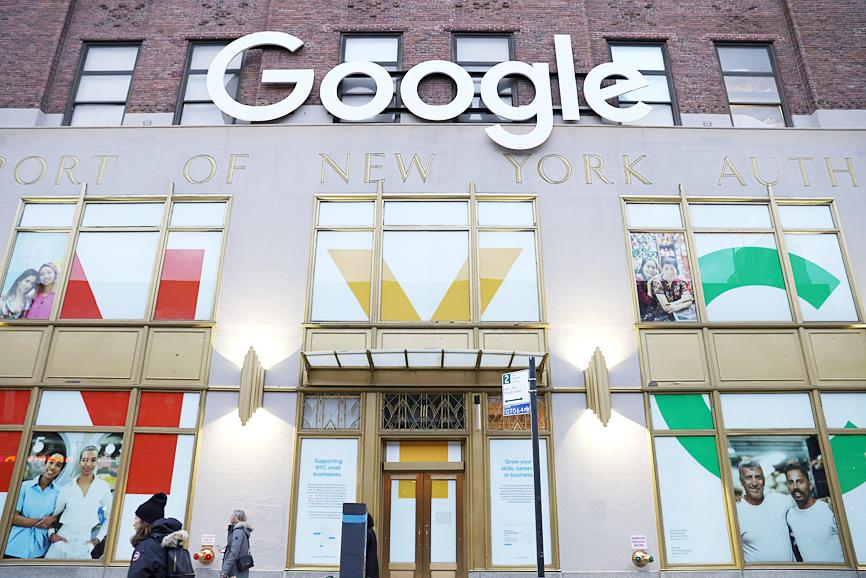Alphabet Inc’s Google said on Wednesday that it would pay an additional bonus to its global employees this year, as the firm pushes back its return-to-office plan.
Google would give all employees, including the company’s extended workforce and interns, a one-time cash bonus of US$1,600 or equivalent value in their country this month, a company spokesperson told Reuters.
The latest benefit is in addition to Google’s work-from-home allowance and well-being bonus, to support its employees during the COVID-19 pandemic, the spokesperson said, without giving details on how much the company has set aside in total for the purpose.

Photo: Reuters
In March, an internal survey showed a drop in its employee well-being over the past year, after which Google announced a series of benefits, including a US$500 well-being cash bonus.
Last week, Google delayed its return-to-office plan indefinitely amid fears over the Omicron variant of SARS-CoV-2 and resistance from some employees to company-mandated COVID-19 vaccinations. It earlier expected staff to return to the office from Jan. 10 next year.
Separately, Lyft Inc said that employees can work remotely for the entirety of next year, a reversal of its previous mandate and one of the longest office-return delays among major companies.
The second-largest US ride-hailing operator revised an earlier requirement for workers to be back at their desks in February next year.
Many companies are changing their return dates yet again in response to the Omicron variant, but few have gone as far as Lyft’s full-year reprieve.
Google informed employees last week that it would not enforce its deadline and would reassess the situation after that.
Uber Technologies Inc, Lyft’s main rival, made a similar move.
Lyft’s offices would fully reopen in February as planned for employees who want to come in, but returning would be optional for the whole year.
The new policy is meant to provide workers with flexibility, a Lyft spokeswoman said.
The change was not “exclusively tied” to Omicron, but the new strain was “a factor contributing to some uncertainty,” she said.
The San Francisco-based company does not plan to go fully remote indefinitely as others, including Twitter Inc, have done.
Lyft would “continue to talk with team members, use their insights and prioritize flexibility as we develop long-term plans for how we work,” the spokeswoman said.

Nvidia Corp chief executive officer Jensen Huang (黃仁勳) on Monday introduced the company’s latest supercomputer platform, featuring six new chips made by Taiwan Semiconductor Manufacturing Co (TSMC, 台積電), saying that it is now “in full production.” “If Vera Rubin is going to be in time for this year, it must be in production by now, and so, today I can tell you that Vera Rubin is in full production,” Huang said during his keynote speech at CES in Las Vegas. The rollout of six concurrent chips for Vera Rubin — the company’s next-generation artificial intelligence (AI) computing platform — marks a strategic

REVENUE PERFORMANCE: Cloud and network products, and electronic components saw strong increases, while smart consumer electronics and computing products fell Hon Hai Precision Industry Co (鴻海精密) yesterday posted 26.51 percent quarterly growth in revenue for last quarter to NT$2.6 trillion (US$82.44 billion), the strongest on record for the period and above expectations, but the company forecast a slight revenue dip this quarter due to seasonal factors. On an annual basis, revenue last quarter grew 22.07 percent, the company said. Analysts on average estimated about NT$2.4 trillion increase. Hon Hai, which assembles servers for Nvidia Corp and iPhones for Apple Inc, is expanding its capacity in the US, adding artificial intelligence (AI) server production in Wisconsin and Texas, where it operates established campuses. This

Garment maker Makalot Industrial Co (聚陽) yesterday reported lower-than-expected fourth-quarter revenue of NT$7.93 billion (US$251.44 million), down 9.48 percent from NT$8.76 billion a year earlier. On a quarterly basis, revenue fell 10.83 percent from NT$8.89 billion, company data showed. The figure was also lower than market expectations of NT$8.05 billion, according to data compiled by Yuanta Securities Investment and Consulting Co (元大投顧), which had projected NT$8.22 billion. Makalot’s revenue this quarter would likely increase by a mid-teens percentage as the industry is entering its high season, Yuanta said. Overall, Makalot’s revenue last year totaled NT$34.43 billion, down 3.08 percent from its record NT$35.52

PRECEDENTED TIMES: In news that surely does not shock, AI and tech exports drove a banner for exports last year as Taiwan’s economic growth experienced a flood tide Taiwan’s exports delivered a blockbuster finish to last year with last month’s shipments rising at the second-highest pace on record as demand for artificial intelligence (AI) hardware and advanced computing remained strong, the Ministry of Finance said yesterday. Exports surged 43.4 percent from a year earlier to US$62.48 billion last month, extending growth to 26 consecutive months. Imports climbed 14.9 percent to US$43.04 billion, the second-highest monthly level historically, resulting in a trade surplus of US$19.43 billion — more than double that of the year before. Department of Statistics Director-General Beatrice Tsai (蔡美娜) described the performance as “surprisingly outstanding,” forecasting export growth